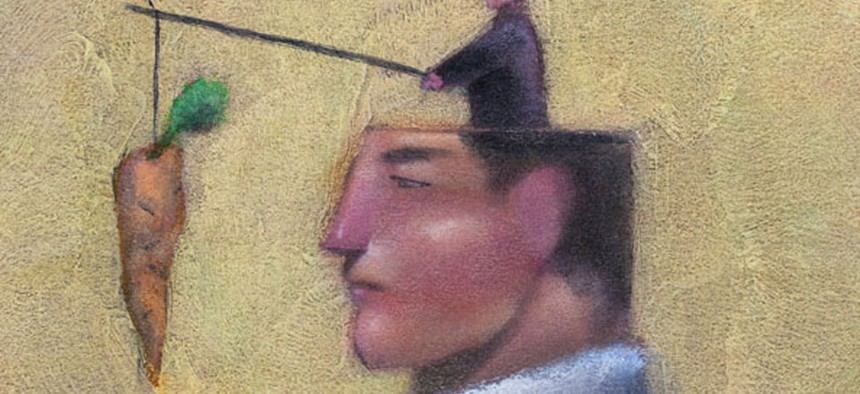
Photodisc
What Makes Employees Work Harder: Punishment or Pampering?
Bad news: Monitoring devices -- and, more gruesomely, massive layoffs -- really do seem to make us more productive
You're a boss. You have a bunch of employees you consider under-motivated, unproductive, and, well, sorta lazy. You wonder: How do I make them talk less? Focus more? Try harder? Think more creatively? Just be better ?
You turn to social science and economic research and find that much of the conclusions appear to be divided into two strategic approaches. For lack of more officious-sounding terms, I'm going to call them: the Feel-Good strategies vs. the Feel-Bad strategies.
The Feel-Good boss is drawn to the research that suggests that just about every thing you can think of that makes workers feel good about themselves also makes them better workers. Four-day workweeks mean more meaningful work hours . Shorter work days translate into better focus . More vacation time means heightened creativity . More short breaks means sharper attention to detail . More "toys" means more creative, playful employees who are necessary for out-of-the-box thinking.
And then the dismal science comes along and finds that, oh, actually, scaring the bejeezus out of workers turns out to be pretty effective too. The Feel-Bad boss is vindicated.
The Great Recession, a Great Motivator
Let's go back to 2008. The economy tanked. Productivity spiked. Why?
There are two basic explanations: the "weakest link" explanation and the "motivation" explanation. When employers have to let people go, they start with the least productive workers -- the weakest links. That makes the remaining team more productive, right? Theoretically. But also, if you think every day is an audition to keep your job, you might be motivated to work harder.
One explanation dramatically overshadows the other when accounting for our productivity boom in the bust, according to economists Edward P. Lazear Kathryn L. Shaw Christopher Stanton, the authors of a new paper "MAKING DO WITH LESS: WORKING HARDER DURING RECESSIONS." Actually, the answer is right there in the headline. Employers made do with less because people worked harder during the recession. Fully 85% of increase in productivity came from workers' "increased effort."
Some pictures to hammer the point home. Here's their look at productivity per worker between December 2007 and July 2009, the official beginning and end of the Great Recession. The recession visibly increased measured effort.

In particular, workers in states with high unemployment changes (BLUE LINE in the graph below) become more productive than workers in states with low unemployment changes (RED DASH line) -- a reversal of what you'd observe in 2006 during better times.

In econo-speak: "an increase in the unemployment rate makes finding an alternative job more difficult, which reduces the relative cost of effort ." In human: People worked harder in states where finding a job was harder, since they were totally freaked out about being unemployed. Fascinatingly, the economists found that the least productive workers had the highest gains in measured effort -- possibly because they felt the most scrutinized in areas with high unemployment.
Big Brother, Inc.
Scrutiny works in mysterious ways. The knowledge that your industry (or state, or macroeconomy) is under siege makes workers feel watched. But what about workers who are, quite literally, being watched?
That was the subject of another recent paper on software that watches workers to make sure they don't steal stuff: Cleaning House: The Impact of Information Technology Monitoring on Employee Theft and Productivity . The New York Times unpacks:
The researchers measured the impact of software that monitors employee-level theft and sales transactions, before and after the technology was installed, at 392 restaurants in 39 states ... The savings from the theft alerts themselves were modest, $108 a week per restaurant. However, after installing the monitoring software, the revenue per restaurant increased by an average of $2,982 a week, or about 7 percent.
What happened here? Yes, theft declined. That's to be expected. But also, revenue spiked. Productivity increased. Turning casual-dining restaurants into casual-dining panopticons made everybody work harder, perhaps by cutting down on procrastination or encouraging waiters to sell more drinks and appetizers to customers.
Productivity research remains something of a spray-and-pray field. There is research suggesting that practically everything that workers enjoy, from cat pictures to naps, amazingly makes them better at their jobs, while there's also research that the *worst things ever* like Great Recessions and employer-monitoring make us more diligent. Perhaps some of these conclusions can live together: Being well-rested at work gives you the mental space to be creative, but the threat of consequences also makes you more arduous on a minute-to-minute basis. There are no absolutes here yet, except, I suppose for one. If you're looking for a job, any job, try North Dakota .






